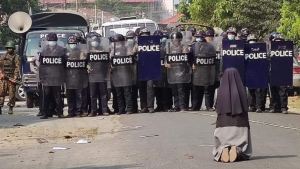Each year, the pope gives a Christmas-New Year’s address to the diplomats from the 183 countries with which the Vatican has diplomatic relations.
It’s a chance for the pope to give his take on the state of the world, as he stands before those who represent every corner of the planet.
This year, speaking of the “endless conflicts” that are plaguing some countries, these are the issues that he highlighted:
Syria – “where the country’s rebirth does not yet clearly appear on the horizon” … “the imposition of sanctions should not strike directly at everyday life, in order to provide a glimmer of hope to the general populace, increasingly caught in the grip of poverty”
Yemen – “a human tragedy that has gone on for years, silently, far from the spotlight of the media and with a certain indifference on the part of the international community“
Israel and Palestine – “in the past year, no steps forward were made in the peace process” …”I would truly like to see these two peoples rebuild mutual trust and resume speaking directly to each other” … “to reach the point where they can live in two states, side by side“
Libya – “institutional tensions”
Sahel region – “episodes of violence by international terrorism”
And internal conflict in:
Sudan
He spoke of the “inequality and injustice, endemic corruption and various forms of poverty” fueling conflict on the American continent
“Reciprocal trust and readiness to engage in calm discussion” needed in:
Ukraine
Southern Caucasus
The Balkans, primarily in Bosnia and Herzegovina – so “the outbreak of new crises can be avoided”
Myanmar – “its streets, once places of encounter, are now the scene of fighting that does not spare even houses of prayer”
Too many weapons
Naturally, these conflicts are exacerbated by the abundance of weapons on hand and the unscrupulousness of those who make every effort to supply them. At times, we deceive ourselves into thinking that these weapons serve to dissuade potential aggressors. History and, sadly, even daily news reports, make it clear that this is not the case. Those who possess weapons will eventually use them, since as St. Paul VI observed, “a person cannot love with offensive weapons in his hands.”
Especially nuclear weapons
A world free of nuclear arms is possible and necessary. […]
The Holy See continues steadfastly to maintain that in the 21st century nuclear arms are an inadequate and inappropriate means of responding to security threats, and that possession of them is immoral. Their production diverts resources from integral human development and their employment not only has catastrophic humanitarian and environmental consequences, but also threatens the very existence of humanity.
The Holy See likewise considers it important that the resumption of negotiations in Vienna on the nuclear accord with Iran (the Joint Comprehensive Plan of Action) achieve positive results, in order to guarantee a more secure and fraternal world.



